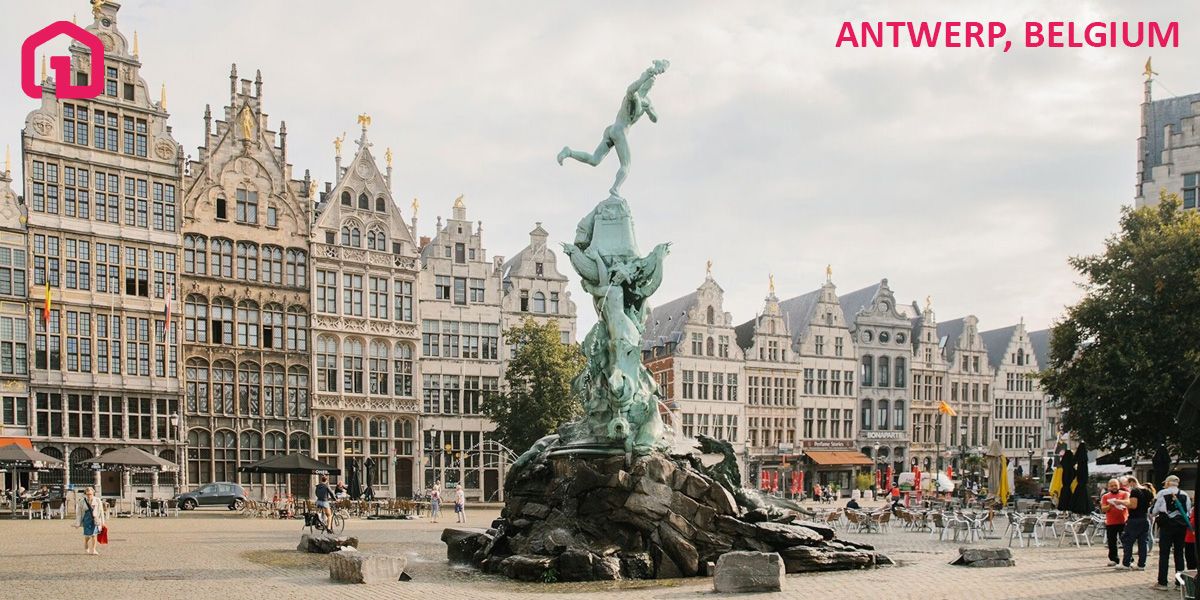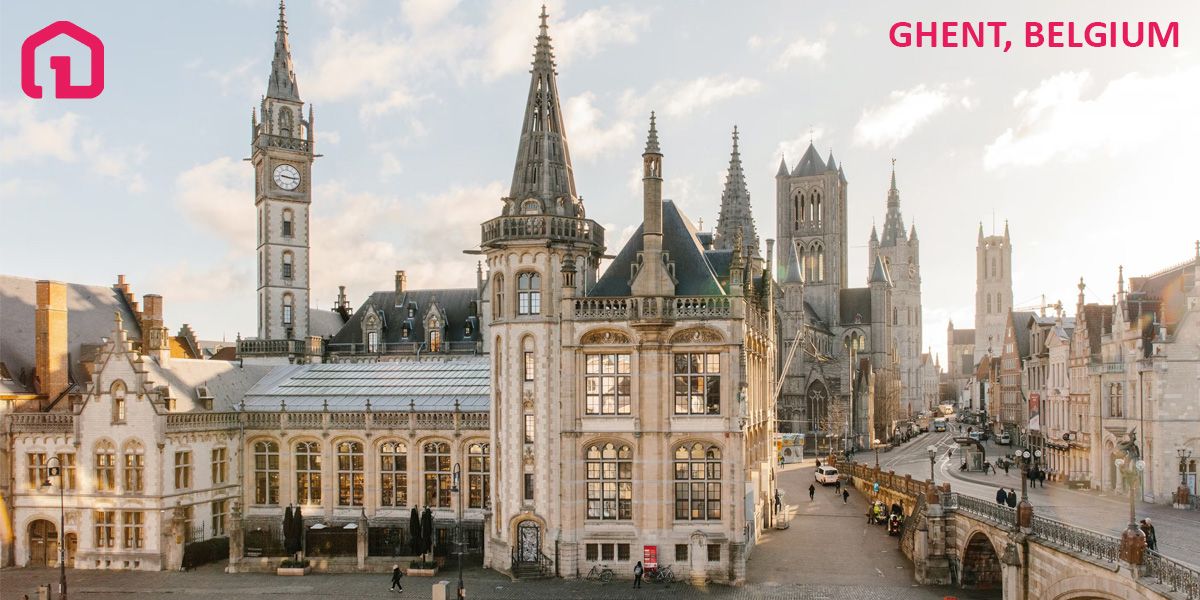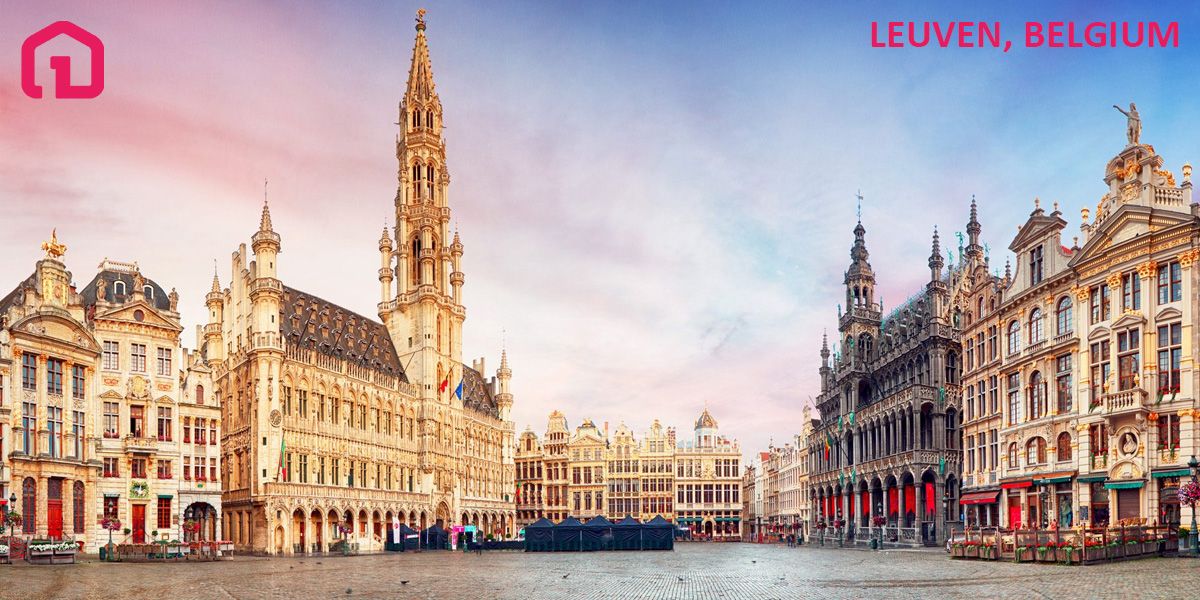CHAT
WITH US
WITH US
GET A
QUOTE
have questions? call us
+44 3330 907053
Home
/
Guides
/
Tips & Secrets
/
The Best Places to Live in Belgium: Our Top Picks
The Best Places to L...

Tips & Secrets • Europe • 28 Nov 2024
Share this article
Choosing where to live in Belgium can significantly impact your experience in this diverse country. From the bustling streets of Brussels to the medieval charm of Bruges, each Belgian city offers its own unique blend of culture, opportunities, and lifestyle. This guide will help you understand the characteristics and benefits of Belgium's most popular cities for expatriates.
Brussels stands as more than just Belgium's capital - it's the de facto capital of Europe, hosting both the European Commission and European Parliament. The Brussels-Capital Region encompasses 19 distinct municipalities, each with its own character and appeal, making it more of a collection of villages than a traditional city. With approximately 2.5 million residents in the metropolitan area and around 36% of the population being of foreign origin, Brussels offers an unparalleled international atmosphere that makes it easier for newcomers to integrate.
The city's economy thrives on international politics, business, and technology sectors, offering extensive career opportunities for English speakers. While housing costs can be high, particularly in popular expatriate areas, the higher salaries and professional opportunities often compensate for the elevated living expenses.
Key advantages of Brussels:
These municipalities represent Brussels at its most cosmopolitan. Etterbeek and Ixelles blend beautiful Art Nouveau architecture with vibrant cultural life. Home to many EU institutions, these areas attract a diverse international community. The neighborhoods feature tree-lined avenues, abundant parks, and excellent shopping districts, particularly around Place Flagey and Avenue Louise.
Key features:
For those seeking a more residential atmosphere while maintaining easy access to the city center, Uccle offers the perfect balance. This green, upscale municipality is particularly popular with families and those who value space and tranquility. Its numerous parks, quality schools, and spacious properties make it ideal for long-term settling.
Key features:

As Belgium's second-largest city and Europe's second-largest port, Antwerp combines economic prowess with cultural sophistication. The city has reinvented itself as a fashion and design capital while maintaining its historical significance in the diamond trade. Its unique blend of historic architecture and contemporary developments creates an engaging urban landscape that attracts creative professionals and families alike.
The city's northern districts have become increasingly popular with expatriate families, offering spacious houses with gardens and easy access to international schools. Meanwhile, the historic center attracts young professionals with its vibrant cultural scene and beautiful, though often expensive, apartments.
Key benefits:
Often called the 'Venice of the North', Bruges offers a unique living experience that combines preserved medieval architecture with contemporary comfort. While tourists flock to the historic center, residential life in Bruges offers a surprisingly peaceful and well-balanced lifestyle. The UNESCO World Heritage city center maintains its historic character while providing all modern amenities, making it particularly attractive to those seeking a more relaxed pace of life.
The city divides naturally into the historic center and the outer ring neighborhoods, each offering distinct advantages. While the center provides immediate access to cultural attractions and amenities, the outer districts offer more spacious living arrangements and a stronger community feel.
Key benefits:
The historic heart of Bruges offers an unparalleled living experience among medieval architecture and cobbled streets. While tourist crowds can be significant during peak hours, mornings and evenings reveal a peaceful, almost village-like atmosphere. Residents quickly learn the quiet back streets and local spots that tourists rarely discover.
Key features:
These residential districts beyond the canals offer a more suburban lifestyle while maintaining easy access to the center. Particularly popular with families, these areas provide larger homes, gardens, and a stronger sense of local community.
Key features:

Often overlooked in favor of Brussels or Bruges, Ghent combines the cultural richness of a historic city with the energy of a university town. The presence of Ghent University drives innovation and keeps the city young at heart, while the historic center rivals Bruges in beauty but feels more lived-in and authentic.
The city has experienced significant regeneration in recent years, with former industrial areas transformed into creative hubs and residential neighborhoods. This combination of historic charm and modern development makes Ghent particularly attractive to young professionals and families looking for a high quality of life at more reasonable prices than Brussels.
Key advantages:
This central district offers a perfect blend of urban convenience and residential calm. Its tree-lined streets and mix of architectural styles create an attractive environment for both families and young professionals. The area's proximity to the university makes it particularly popular with academics and researchers.
Key features:
The historical heart of Ghent, Patershol offers characterful living in one of the city's oldest neighborhoods. Its narrow cobbled streets house an eclectic mix of restaurants, boutiques, and renovated historic homes. While tourist numbers are growing, the area maintains its authentic local feel.
Key features:

Just 25 minutes by train from Brussels, Leuven offers a compelling mix of academic excellence and quality of life. Home to KU Leuven, one of Europe's oldest and most prestigious universities, the city pulses with intellectual and cultural energy while maintaining a manageable size that creates a strong community feel. Unlike many university cities, Leuven successfully balances its student population with permanent residents, creating a vibrant yet livable atmosphere.
The city's architectural heritage, including the stunning university library and UNESCO-listed Grand Béguinage, provides a beautiful backdrop to daily life. Despite its historic character, Leuven is thoroughly modern, with a growing technology sector and strong research facilities making it increasingly attractive to professionals beyond the academic sphere.
Key advantages:
This southern district has become particularly popular with expatriate families, offering a pleasant mix of green spaces and urban amenities. Home to part of the university campus and several research facilities, Heverlee provides an intellectual atmosphere alongside practical family living.
Key features:
Often overlooked by expatriates in favor of Flanders or Brussels, Liège offers unique opportunities and a distinctly different flavor of Belgian life. As the economic capital of Wallonia, it combines industrial heritage with modern development, particularly in technology and logistics sectors. The city's French-speaking culture and proximity to Germany and the Netherlands make it especially interesting for those seeking a truly European experience.
Recent urban renewal projects have transformed many areas of the city, while maintaining its historic character and famous folklore traditions. The cost of living is notably lower than in cities like Brussels or Antwerp, making it an attractive option for those seeking value for money.
Key benefits:
This island district in the Meuse River has developed into one of Liège's most characterful neighborhoods. Once working-class, it's now a vibrant cultural quarter that maintains its authentic feel while attracting artists and young professionals.
Key features:
Tervuren represents the gold standard of suburban living near Brussels. Located at the end of a beautiful tram line through the Sonian Forest, it offers a perfect blend of accessibility and escape. The area is particularly popular with diplomatic and international business families, drawn by the prestigious British School of Brussels and extensive parkland surrounding the Royal Museum for Central Africa.
Despite being officially in Dutch-speaking Flanders, Tervuren maintains a decidedly international character, with English and French commonly heard alongside Dutch. The housing stock tends toward the luxury end of the market, with spacious villas and generous gardens being the norm rather than the exception.
Key features:
Famous for its battlefield, modern Waterloo has evolved into a self-contained satellite city of Brussels that particularly appeals to international families. With its high concentration of international schools, extensive shopping facilities, and strong expat community, it offers many of the advantages of Brussels at a slightly more relaxed pace and often lower cost.
The city has developed distinct neighborhoods, each with its own character, while maintaining excellent connectivity to Brussels. The strong presence of American and Scandinavian communities has influenced the development of facilities and services catering to international residents.
Key advantages:
When selecting your new home in Belgium,you need to look beyond simple city rankings and into how each location aligns with your lifestyle, career goals, and personal circumstances. Belgium's diverse cities each offer distinct advantages and cultural experiences that can significantly impact your quality of life.
The professional landscape in Belgium varies dramatically by region, with each major city offering unique career ecosystems. Brussels, as the administrative heart of Europe, naturally dominates the international job market, but other cities present compelling opportunities in specific sectors.
Brussels offers unparalleled opportunities for those seeking international careers, particularly in policy, diplomacy, and corporate headquarters. The presence of the European Union institutions creates a unique ecosystem where international organizations, lobbying firms, think tanks, and global corporations cluster together. This concentration creates a "spillover effect," where even companies not directly related to EU affairs often place their European headquarters here to be close to decision-makers.
The city's job market is particularly robust for those working in:
However, competition for top positions can be intense, and networking is crucial. The city's professional organizations and industry events provide essential platforms for career development. Salaries typically range 15-20% higher than other Belgian cities, though this is partially offset by higher living costs.
Antwerp presents a compelling alternative for those seeking a different pace. The city's economy centers around its port - the second largest in Europe - creating opportunities in logistics, shipping, and international trade. The city has also reinvented itself as a hub for fashion and creative industries, while maintaining its historic strength in the diamond trade.
What makes Antwerp particularly attractive is its combination of established industries and emerging sectors. The city has invested heavily in innovation, particularly in:
The cost of living runs about 20% lower than Brussels, while salaries remain competitive, particularly in specialized technical roles.
Family life in Belgium requires careful consideration of various factors, from education to community integration. Different cities offer distinct advantages for family living, each with their own approach to work-life balance and child-friendly amenities.
These suburban areas have evolved into premium family destinations for specific reasons. Tervuren, located at the edge of the beautiful Sonian Forest, offers an exceptional quality of life that combines nature access with urban convenience. The presence of the British School of Brussels has created a strong anglophone community, making integration easier for English-speaking families.
Waterloo has developed differently, becoming almost self-contained with its own ecosystem of international schools, shopping centers, and family facilities. The area's history of hosting international families means local services are well-adapted to expatriate needs, from English-speaking medical practices to activity clubs catering to international children.
What makes these areas particularly suitable for families:
These cities offer a different family experience, one more immersed in Belgian culture while maintaining high living standards. Bruges, despite its tourist appeal, has quiet residential neighborhoods perfect for families, particularly in areas like Sint-Andries and Sint-Michiels. These districts combine historical charm with modern amenities and excellent schools.
Ghent offers perhaps the best balance of all Belgian cities for families seeking cultural immersion alongside practical convenience. The city's size means everything is accessible, while its university ensures a forward-thinking, international atmosphere. The cost of living runs approximately 30% lower than Brussels, making it easier to afford larger family homes.
Understanding Belgium's regional economic variations is crucial for those mindful of costs. The country's unique federal structure creates distinct economic zones with significant differences in living costs, housing markets, and general affordability.
Liège and other Wallonian cities offer substantially lower living costs than their Flemish or Brussels counterparts, but this comes with important trade-offs. In Liège, for example, housing costs average 40-50% lower than Brussels, with a typical two-bedroom apartment renting for €700-900 monthly compared to €1,200-1,500 in the capital. However, this affordability reflects the region's economic realities - lower average salaries and fewer international job opportunities.
What makes Wallonian cities particularly attractive for budget-conscious movers:
Leuven and Ghent have evolved into smart choices for those seeking value without compromising on quality of life. These cities benefit from their large student populations, which help maintain reasonable rental markets while supporting vibrant cultural scenes.
Leuven, despite its proximity to Brussels, maintains housing costs roughly 25% lower than the capital. The city's economy, driven by the university and growing technology sector, provides good employment opportunities while offering:
The experience for single professionals varies dramatically between Belgian cities, with each offering distinct social and cultural environments that can significantly impact quality of life.
Brussels offers an unparalleled environment for single expatriates, particularly those in their 20s and 30s. The city's international character creates natural social networks through:
The city's communes like Ixelles and Saint-Gilles have evolved into hubs for young internationals, offering:
These cities offer compelling alternatives for singles seeking a more distinctly Belgian experience while maintaining international connections. Antwerp's fashion and design scene creates a naturally young, creative atmosphere, particularly in neighborhoods like Zuid and Berchem. The city's port heritage adds a gritty, authentic character that contrasts with Brussels' more polished international vibe.
Ghent's large student population and growing tech sector make it particularly appealing for young professionals who want to:
Retirement in Belgium requires careful consideration of different factors than working-age moves. Access to healthcare, pace of life, and community integration become paramount concerns.
Bruges and coastal cities like Ostend offer particular appeal for retirees. Beyond their obvious aesthetic charm, these cities provide:
The slower pace of life in Bruges, often seen as a disadvantage for younger residents, becomes an asset for retirees. The city's tourist infrastructure means excellent amenities and services are available year-round, while residential areas remain peaceful and well-maintained.
For retirees seeking more exclusive environments, areas like Tervuren and Uccle offer:
These areas command premium prices but provide an exceptional quality of life, particularly for those who want to maintain international connections while enjoying a quieter lifestyle.
Belgium's linguistic landscape significantly impacts daily life and integration possibilities. Understanding the language dynamics of each region is crucial for long-term satisfaction.
The capital's official bilingual status creates a unique environment where neither French nor Dutch speakers feel disadvantaged. English functions as a de facto third language, particularly in:
However, learning some French remains important for deeper integration into Brussels life, as it's the predominant language in many social situations.
Choosing your ideal Belgian city requires careful consideration of multiple factors, and while this guide provides comprehensive information, there's no substitute for personal experience. We recommend taking these practical steps before making your final decision:
Belgium's weather can significantly impact quality of life, and each city handles the seasons differently. Brussels might feel grey and administrative in winter but comes alive in summer with street festivals and outdoor dining. Coastal cities like Ostend offer beautiful summers but can be windswept in winter. Consider visiting your shortlisted cities across different seasons to get a true feel for year-round living.
Rather than sticking to tourist areas, spend time in residential neighborhoods you're considering. Visit during both weekdays and weekends, morning and evening. Shop in local supermarkets, use public transport, and try to imagine your daily routine. Each city's rhythm differs - Antwerp's fashion district pulses with energy during the week but quietens significantly on Sundays, while tourist-heavy Bruges sees the opposite pattern.
The expatriate community in Belgium is welcoming and well-organized. Make use of:
Real experiences from current residents can provide invaluable insights that statistics and guides can't capture.
Think beyond your immediate needs. A city that suits you perfectly now might become less ideal as your circumstances change. Consider:
Once you've chosen your ideal Belgian city, the next step is planning your relocation. Moving internationally requires careful coordination and expertise, particularly when navigating Belgium's specific requirements and regulations.
Deliver1 specialises in international removals to Belgium, offering comprehensive door-to-door services tailored to each city's unique characteristics. Whether you're moving to a historic house in Bruges, a modern apartment in Brussels, or a spacious villa in Tervuren, our experienced team understands the specific challenges and requirements of each location.
Get in touch with Deliver1 today to discuss your move to Belgium. Our experts can provide detailed advice about moving to your chosen city, from parking permits for removal vehicles in historic centers to access requirements for Brussels' apartment buildings. Let us help make your transition to Belgian life as smooth as possible.
Remember, choosing the right city is just the first step - ensuring your belongings arrive safely and efficiently at your new home is equally important for a successful start to your Belgian adventure.
For removal quotes or detailed moving advice specific to your chosen Belgian city, contact Deliver1:
We're here to help you make your move to Belgium a success, wherever you choose to call home.
We love hearing from you-so please get in touch with any questions or queries.
We love hearing from you-so please get in touch with any questions or queries.
Working hours
Mon - Sat: 08:00 - 17:00
Sun: Closed
Call
+44 3330 907053Location
Unit 3, Newyears Green Lane
Newyears Green
Uxbridge
UB9 6LX
United Kingdom
